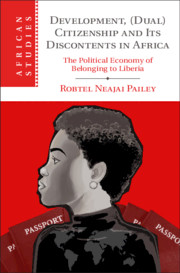 Development, (Dual) Citizenship and Its Discontents in Africa
Development, (Dual) Citizenship and Its Discontents in Africa Published online by Cambridge University Press: 07 January 2021
Divided into three parts, Chapter 1 outlines the rationale for selecting respondents—homeland Liberians, permanent and circular returnees, diasporas—with an overview of their demographic profiles; the conceptual framework, actor-oriented analysis, which considers myriad responses to development interventions based on actors’ disparate life-worlds (lived experiences), social locations (socio-economic positions), and levels of agency (capacity to act); as well as deep thinking about the author’s positionality. The methodological, theoretical, and biographical reflections in this chapter are intended to contextualise how the author came to understand Liberia’s political economy of belonging and its relationship to contestations over dual citizenship.Chapter 1 demonstrates why it was essential to converse with Liberian actors inhabiting different locales in three continents. It shows, for example, that diasporas disclose through their identities, practices, and relationships that citizenship can be simultaneously passive, active, and interactive. They also both challenge and substantiate certain theoretical approaches including conceptualisations of diasporic influences on homeland foreign policy and, by the author’s extension, homeland domestic policy. Reflecting on her positionality as a Liberian researcher who has occupied multiple spaces and places, the author evaluates her own biases as someone who made a conscious choice not to naturalise abroad and how this decision influences her analysis of Liberian citizenship construction and practice.
To save this book to your Kindle, first ensure no-reply@cambridge.org is added to your Approved Personal Document E-mail List under your Personal Document Settings on the Manage Your Content and Devices page of your Amazon account. Then enter the ‘name’ part of your Kindle email address below. Find out more about saving to your Kindle.
Note you can select to save to either the @free.kindle.com or @kindle.com variations. ‘@free.kindle.com’ emails are free but can only be saved to your device when it is connected to wi-fi. ‘@kindle.com’ emails can be delivered even when you are not connected to wi-fi, but note that service fees apply.
Find out more about the Kindle Personal Document Service.
To save content items to your account, please confirm that you agree to abide by our usage policies. If this is the first time you use this feature, you will be asked to authorise Cambridge Core to connect with your account. Find out more about saving content to Dropbox.
To save content items to your account, please confirm that you agree to abide by our usage policies. If this is the first time you use this feature, you will be asked to authorise Cambridge Core to connect with your account. Find out more about saving content to Google Drive.